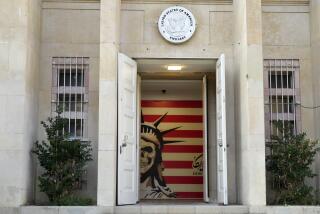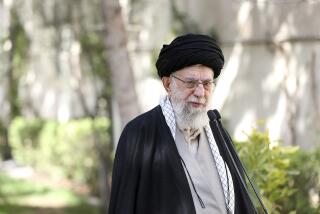Iran’s supreme leader downplays foreign links to unrest
- Share via
TEHRAN — In a move seen as an attempt to woo disenchanted moderates and reformists back into the political establishment, Iran’s supreme leader said in comments published Thursday that he was not convinced leaders of recent unrest were acting on behalf of foreign interests.
The comments by Ayatollah Ali Khamenei, the country’s top political and religious authority, distanced him from assertions made by hard-liners.
However, he also asserted that the days of protest that followed the disputed June 12 presidential election were part of a conspiracy to undermine the Islamic Republic.
“I believe that such action did not start after the election or a few days before the election,” he told college students and professors Wednesday night ahead of what many expect will be a tumultuous school year.
“This was preplanned,” he said. “I am not accusing the involved people of being foreign agents, such as agents of the U.S. or Britain. I am not making such a claim because such a thing has not been proven to me and I can’t talk about something which hasn’t been proven.”
Hard-liners close to President Mahmoud Ahmadinejad, who was declared the winner of the election and inaugurated for a second term, have repeatedly accused Western governments of involvement in the protests.
Analysts saw Khamenei’s speech as an attempt to cool tempers on campuses, or at least deflect anger away from the supreme leader before the school year begins. News websites described college students chanting “Death to the dictator!” -- an apparent reference to Ahmadinejad -- as they arrived for the first day of classes in the southern city of Shiraz last week.
Khamenei urged calm and played down the political rift.
“Everybody be vigilant so that these trivial and small political problems might not damage the scientific activities, classes and research centers,” he said.
But he also appeared to be bolstering the stature of a newly energized judiciary branch headed by Sadegh Larijani, the scion of a famous family that has clashed with Ahmadinejad’s faction. The government has staged a series of televised court proceedings against its opponents, derided as show trials by critics.
“No crime or criminal will be ignored,” Khamenei said.
But “the judiciary has to carry out investigations and if it finds evidence of infringement -- whether it be political, economic or in relation to varieties of corruption -- it should make a ruling based on this evidence.”
More to Read
Sign up for Essential California
The most important California stories and recommendations in your inbox every morning.
You may occasionally receive promotional content from the Los Angeles Times.













